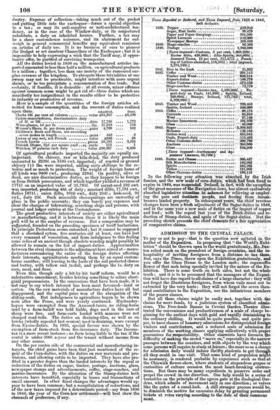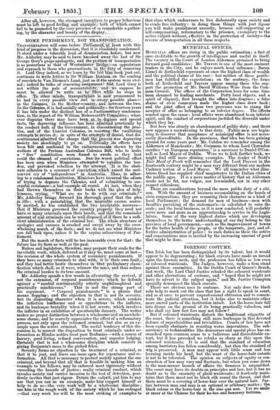To pay or not to pay---that is the question now
agitated in the natter of the Expeniton. In proposing that " the World's Xxhi- bition„ should be thrown open to the world. aatuitously, Mr. Rex- ton relied much on the precedent of foreign countries, and the in- hospitality of inviting foreigners from a distance to tax them. But, says the Times, throw open the Exhibition gratuitously, *nil you offer the Glass House to the London mob ; the ragamuffin flower of that mob being specially invited by the nature of the Ex- hibition. There is some truth on both sides, but not the whole truth ; and it is to be presumed that the managers of the Exposi- tion will have due regard to all claims of a large character : they will not forget the illustrious foreigners, from whom wits must not be extracted by the very hosts ; they will not forget the seven thou- sand contributors to the Exposition, nor the industrious members
of the poorer classes. ,
But all these claims "might be easily met, together with the claims for more funds, by a judicious system of classified amis.- sions. The Free-trade Bazaar in Covent Garden Theatre illus- trated the convenience and productiveness of a scale of charge be- ginning for the earliest days with gold and rapidly diminishing to the ordinary shilling. It would be quite possible, and quite pro- per, to have classes of honorary admissions for distinguished foreign viaiters and contributors, and a reduced scale of admission for members of the working classes applying collectively with proper guarantees for.nsapectability. Other alarmists have foreseen the difficulty of making the crowd "move on,” especiallyin the narrow passages between the counters, and with objects by the way wiliat some_ persons will require to study at leisure ; the more seas a charge for admission daily would induce thrifty stedepts to get throngli all they could in one visit. That some kind of propulsion might be necessary, is rendered probable by experience such as that at the Chiswick flower-show, where students of stupendous grapes or curiosities of culture occasion the most heart-breaking obstruc- tions. But there may be many expedients to preserve order and propel the crowd in one direction. One help would be a series of turnstiles on the principle of the egress gate at the Zoological Gar- dens, which admits of movement only in one direction; or valves like the gates of a canal-lock. A still stronger process would be, to diminish the motive for excessive delay by granting permanent tickets at rates varying according to the date of their commezie meat. After. all, however, the strongest,,iitkentixes to proper behaviour mint be deli to' geed feeling and'' mj1ebdth of which cannot fail to he promoted by the very presence of so remarkable a gather- ing, by the elieraoter and beauty of the, display.



























 Previous page
Previous page